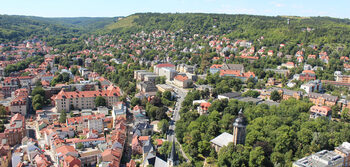and Balkan Europe
by IECOB & AIS Università di Bologna

This area offers a wide range of continuously updated news regarding both academic and cultural events together with academic calls and study programs
International Conference - Alternative Encounters: The ‘Second World’ and the ‘Global South’, 1945-1991
Conference venue: Imre Kertész Kolleg, Friedrich-Schiller-Universität, Jena
Period: November 3-4 2014

- Jena
Description
In the post-war period, as decolonization accelerated, new linkages opened up, and existing ties were remade, between the so-called ‘Second World’ (from the Soviet Union to the GDR) and the ‘Global South’ (from Latin America to Africa to Asia). Contacts multiplied through, for instance, the development of political linkages; economic development and aid; health and cultural and academic projects; as well as military interventions. Yet these important encounters, and their impacts on national, regional and global histories, have hitherto only played a marginal role in accounts of late 20th century globalization, which have mainly focused on links between the West and former colonies, or between the countries of the ‘Global South’. There is still little study of the interaction between these areas, where commonly shared – and contested – beliefs in the power of socialist modernization and anti-imperial culture opened up possibilities of meaningful transfers during the Cold War and its aftermath. This conference seeks to address this lacuna, by bringing together specialists working on forms of exchange, intervention and subjugation. In doing so, it seeks to provide new insights into the global circulation of ideas during the Cold War, and explore ‘the socialist world’ as a dynamic hub of global interactions during the second half of the twentieth century.
Enquiries about attendance should be sent to: imre-kertesz-kolleg@uni-jena.de
Programme
Monday 3rd November
9.30 a.m. Opening/Welcome
9.45 a.m.
I: CONCEPTS: GLOBALISATIONS, GLOBAL CIRCULATION, AND THE SOCIALIST WORLD SYSTEM
Jonas Flury (Bern), The idea of a socialist world system 1950s - 1970s. Conceiving an alternative global system; theories of growing interconnectedness and exchange in the socialist world.
Oscar Sanchez-Sibony (Macau), An Economic Cold War? The Soviet Union and the Decolonization Vortex
Artemy M. Kalinovsky (Amsterdam), Colony, Model, Colony: Soviet Central Asia and Cold War Development
Bogdan C. Iacob (Center of Advanced Studies, Sofia), From Periphery to Cardinal Borderland: The Balkans into UNESCO
12 a.m. Lunch
1 p.m.
II: ECONOMIC KNOWLEDGE BETWEEN ‘EAST’ AND ‘SOUTH’
Massimiliano Trentin (Bologna), "Tough Negotiations": the partnership between the German Democratic Republic and B'athist Syria, 1963-1970.
Berthold Unfried (Vienna), Encounters and transfers between GDR development workers and their African counterparts
Sara Lorenzini (Trento), Changing Perceptions: The GDR in Africa.
Ma³gorzata Mazurek (Columbia), Bandung Economics: Polish Economic Advisors in India, 1955-1960
Coffee
3.30 p.m.
III: INTELLECTUAL CULTURES AND EXCHANGE
£ukasz Stanek (Manchester), Tropical Modernism and Socialist Internationalism: The Case of Ghana National Construction Corporation (1960—66).
Andreas Butter (Bauhaus Dessau Foundation) and Christoph Bernhardt (TU Darmstadt), Networking across the iron curtain, competing for the global south: The International Union of Architects (UIA) and the export of East-German socialist architecture to the global south (1949-1989)
Christine Varga-Harris (Illinois State), Orientalism, Soviet-Style: Cultural Exchange and the Inevitability of Communism in the World of Soviet Woman
5.15 p.m.
KEYNOTE : Professor Andreas Eckert
7 p.m. Conference dinner
Tuesday 4th November
10 a.m.
IV: ASIA AND THE ‘SECOND WORLD’
Jan Zofka (Leipzig) China as a Role Model? Transnational power relations and economic regulation in the “socialist world” seen through the Great Leap Forward in Bulgaria
Péter Vámos (Institute of History, Hungarian Academy of Sciences) China and the Eastern Bloc in the Global South
Hanna Jansen (Amsterdam), Soviet Oriental Studies as a Platform to Negotiate Asian Relations and Identities
12.15 p.m. Lunch
1.15 p.m.
V: LATIN AMERICA AND THE ‘SECOND WORLD’
Péter Apor (Institute of History, Hungarian Academy of Sciences) and James Mark (Exeter), The Discovery of Latin America in Socialist Hungary 1956-1989
Anne Gorsuch (University of British Columbia), Visiting the ‘Island of Freedom’: The Soviet Encounter with Cuba in the 1960s
David Mayer (Vienna), Latin America’s ‘History Wars’ in the 1960s and exchanges between Latin American and ‘Second World’ intellectuals
Coffee
3 p.m.
VI: THE ‘GLOBAL SOUTH’ AND CHALLENGES TO STATE SOCIALISM
Vladimir Boyko (Altai State Pedagogical Academy), Soviet-Afghan discoveries in the 1920s-70s: diplomacy, intelligence, and scholarship
Kim Christiaens & Idesbald Goddeeris (KU Leuven), SolidarnoϾ and the Global South
Piotr Wciœlik (Central European University), Non-violence and Double Standards: Solidarity with Fighting Afghanistan in late-dissident Poland
4.45pm - Final Discussion
Early Career/ PhD ‘Poster Presentations’
Ela Dr¹¿kiewicz (NUI Maynooth), Polish Aid to Africa during the Cold War
Dan Gashler (Binghamton), Reimagining Slovenia’s National Liberation War, in Vietnam: Understanding the Chaos of 1968
Yulia Gradskova (Stockholm), The Soviet education of internationalism between “othering” and “bringing closer”: the case of Latin America
Ljubica Spaskovska (Exeter), ‘We have gathered from all continents of the Globe…’ – Cold War youth encounters in late socialism
Kamil Szmid (Adam Mickiewicz University in Poznan), A communist journalist in the midst of political transformation. Ryszard Kapuœciñski’s travels through Africa.
Bálint Tolmár (Central European University, Budapest), Labor Migration between Eastern Europe and the Third World: the Case of Cuban Temporary Workers in Socialist Hungary, 1980-1988
Natalia Telepneva (London School of Economics),The Soviet Union and the Development of the ‘Embryo State’ in Angola, Mozambique, and Guinea-Bissau, 1967-1970.
Organizer
- Imre Kertész Kolleg, University of Jena
- the Centre for Area Studies, University of Leipzig
- Centre of Imperial & Global History, University of Exeter
Information & contacts
Imre Kertész Kolleg
University of Jena
e-mail: imre-kertesz-kolleg@uni-jena.de








